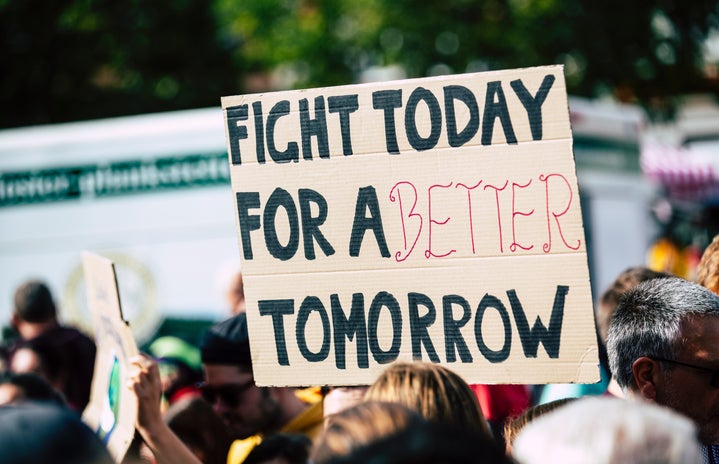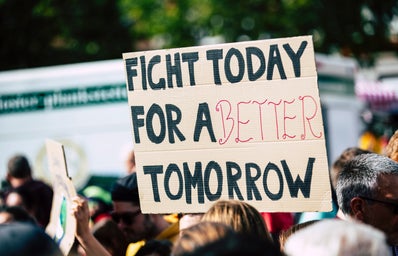Content Warning: Beans includes anti-Indigenous racism and violence, self-harm, and mentions of sexual assault; viewer discretion advised.
If you’re a fan of Avatar: The Last Airbender, then you’re probably familiar with Kiawentiio Tarbell. The 18-year-old actress and singer, known mononymously as Kiawentiio (pronounced Gya-wuhn-dee-yo), quickly rose to internet fame for her role as Katara in the live-action Avatar series. Katara might be her most well-known role, but she has been acting since she was a child and has amassed an impressive resume. While I enjoyed the live-action Avatar series, I believe Kiawentiio’s most impressive work is the 2020 film Beans.
Created by Tracey Deer, Beans follows the story of a Mohawk (Kanyen’kehà:ka) family in 1990 Quebec. The film is based on the true events of the Kanesatake Resistance or the Oka Crisis. During this period of 78 days, the Mohawk community of Kanesatake in Montreal protested the development of sacred land. As the Mohawk people strengthened their defenses, the Quebec police invaded the reserve in a standoff that left almost 100 Mohawk individuals injured. At the end of the Oka Crisis, the Canadian government bought the land and the development was canceled; however, there has been no official returning of the land to the Mohawk people. Tracey Deer was 12 years old when the Oka Crisis began in her community. Drawing from her own experiences, she created Beans to spread her voice and empower other Indigenous voices.
I was captivated just moments into the film. 12-year-old Tekehentahkhwa, played by Kiawentiio, sits at an interview for a private school. She introduces herself several times, but when the principal of the school is still unable to pronounce her name, she smiles and says that her nickname is “Beans”.
Following the interview, Beans introduces the viewers to the developing Oka Crisis. Beans, accompanied by her younger sister (Violah Beauvais) and their mother (Rainbow Dickerson), meet the Mohawk protestors to help them collect firewood. Their mission is soon cut short by an explosion and gunfire that leaves a police officer dead. Hoping that the violence will end there, Beans and her family help join the rest of their community in building a barricade.
Throughout the film, tensions rise and violence escalates. Beans is faced directly with this violence when she and her family are prevented from purchasing groceries, and then harassed by a group of Canadian citizens. Very quickly, the crisis from Beans’ perspective devolves from a more light-hearted display of Native rights to a passionate defense of sovereignty from white violence. Beans aids the construction of this story by interpolating real footage of the crisis between scenes, relaying the intensity of the resistance.
The increase in violence acts as a jump-start to Beans’ journey into adulthood. Frustrated by the turmoil around her, she goes to a closed-off teenage girl, April (Paulina Alexis), in her community to help teach her to be “tough”. April befriends Beans using a tough love approach, teaching her how to fight, resist pain, and dress in more mature clothing. This introduces a primary issue in Beans’ coming-of-age: the struggle between advocacy through peace versus advocacy inspired by anger. As Beans’ mom is focused on peaceful protests as a means to achieve rights, the two start to drift apart as Beans begins to embrace April’s more aggressive approach.
As the movie progresses, Beans spends more and more time with April, rebelling against her mother. As the Oka Crisis worsens, Beans leaves to stay at a hotel with her mom and sister because it is no longer safe at their home. This event leads viewers to arguably the most transformative scene of the film. As Beans and her family drive to the hotel, they are met with an angry mob of white protestors who throw rocks and chant slurs at the passing cars. This devastating scene—a depiction of real events from the crisis—channels Beans’ growing anger outward. When they get to a safe place, Beans sees the Canadian police officers laughing. Infuriated, she grabs the rocks that had landed in her car and throws them at the officers, screaming, “Why didn’t you help us?” After threats of arrest, Beans’ mom pulls her away and they continue on to the hotel.
This scene was what captivated me the most about the film. It represents the entire message of the film as a coming-of-age historical-based drama. Up until this point, Beans has remained a relatively quiet young girl under the wing of her mother. Her confrontation with the police officers is her most direct breakthrough into teenagehood, processing the role of anger within her life and activism. Thrown into the middle of the intense Oka Crisis, racism and violence play a large role in her development.
This brings me to another big issue in Beans’ life. As she’s struggling with peaceful and violent approaches to activism, she’s also navigating an early coming-of-age when she should be able to enjoy her childhood. This is a common issue among children of color, who are forced to grow up faster than white children because they have to learn to live within a society that inflicts discrimination and violence. It is this premature growth that pushes Beans to look for role models in older teenagers.
Following the confrontation with the police, Beans meets up with April and the other older teens at the hotel. Beans joins the older teens in drinking and truth or dare, eventually going into the closet and kissing April’s brother Hank (D’Pharaoh Woon-A-Tai). April believes Beans is too young for this, and the two get into an argument. Beans, Hank, and some of the other teenagers end up going into the hotel’s game room to play pool. When she notices young white kids giving them weird looks, Beans starts yelling and attacks one of them.
Outraged at Beans’ behavior, her mom takes them all back home. But as they make their way home, they are met with another angry mob attacking their car and burning an effigy of a Mohawk warrior. The group is forced to return home on foot, fleeing white citizens and Canadian police officers. With her family still mad at her, Beans meets the teenagers at a bonfire. She unsuspectingly follows Hank into the woods to collect firewood when he attempts to assault her. Beans is able to escape and tell April about what happened, who not only believes her immediately but confides in her about her own experience with sexual assault. This turning point in their relationship—their shared experiences as young Mohawk women—overcomes their previous argument and they become friends again.
As the film and the Oka Crisis come to an end, Beans and April develop their friendship. Beans apologizes to her mother for her rebellion but does not let go of the outspoken young woman she has become over the course of the crisis. The movie concludes with Beans’ first day at her new private school. She stands in front of the class and says, “My name is Tekehentahkhwa,” and the film ends. I was incredibly moved when I first watched this movie, and still was when I rewatched it. Tracey Deer has created a captivating drama that expertly intertwines a young girl’s coming-of-age with a real resistance in Mohawk history. The film follows the Oka Crisis through Beans’ eyes, and in turn examines how Beans was changed by it. Kiawentiio does a beautiful job portraying Beans’ internal and external conflicts throughout the film, including her political and personal transformation. Beans also emphasizes community-based activism, examining the complexities of different forms of protest without holding one of higher importance than the other. Further, the film begins and ends with the same line, effortlessly concluding the story and demonstrating Beans’ increased connection to her Mohawk identity. This beautifully executed film serves as an inspiration to all viewers.


